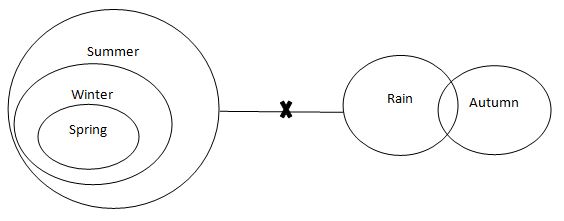Question
Statements : All springs are winters. All
winters are summers. No summer is a rain. Some rains are autumn. Conclusions : I . Some springs are summers. II. Some winters are definitely not rains. Directions (1-5): Read both the conclusions and then decide which of the given conclusions logically follows from the given statements disregarding commonly known facts. Give answer— (1) if only conclusion I is true. (2) if only conclusion II is true. (3) if either conclusion I or conclusion II is true. (4) if neither conclusion I nor conclusion II is true (5) if both conclusions I and II are true.Solution
 Alternate solution: All springs are winters(A) + All winters are summers(A) `->` All springs are summers(A) `->` I.I. `->` Some springs are summers(I). Hence conclusion I follows. All winters are summers(A) + No summer is a rain(E) `->` No winter is a rain(E) `->` I.I `->` Some winters are not rains(O). Hence conclusion II follows.
Alternate solution: All springs are winters(A) + All winters are summers(A) `->` All springs are summers(A) `->` I.I. `->` Some springs are summers(I). Hence conclusion I follows. All winters are summers(A) + No summer is a rain(E) `->` No winter is a rain(E) `->` I.I `->` Some winters are not rains(O). Hence conclusion II follows.
India successfully test-fired which missile off the Odisha coast?
In the context of the inauguration of the Gyaltsuen Jetsun Pema Wangchuck Mother and Child Hospital in Bhutan, what does this symbolize in terms of Indi...
The State of the World’s Forests (SOFO) 2022 report was released by which organisation?
LIC, ____________________ and New India Assurance are identified as Domestic Systemically Important Insurers (D-SIIs) for 2021-22.
The Centre has slashed the Faster Adoption and Manufacturing of (Hybrid &) Electric Vehicles (FAME-II) subsidy of electric two-wheelers to ____ per Kwh ...
Which airport in India has been ranked the world ’ s 10th busiest?
Which Indian state launched the largest waste-to-energy power plant, inaugurated by Union Home Minister Amit Shah?
Under PM GatiShakti, how many aspirational districts will initially benefit from the district master plan?
India’s second highest civilian award The Padma Vibhushan has been conferred to whom for the public affairs category?
Which Indian state recently launched the 'Ladki Bahin Yojana'?
Relevant for Exams:



